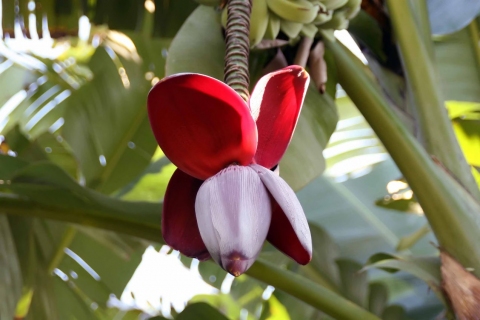Musa balbisiana
Colla
Musaceae
Musa × sapientum pruinosa (King ex Baker) A.M.Cowan & Cowan
Musa × sapientum pruinosa King ex Baker
Musa bakeri Hook.f.
Musa brachycarpa Backer
Musa elata Nakai
Musa liukiuensis (Matsum.) Makino ex Kuroiwa
Musa martini Van Geert
Musa pruinosa (King ex Baker) Burkill
Musa rosacea Jacq.
Musa textilis liukiuensis (Matsum.) Matsum.
Common Name: Plantain
General Information
Musa balbisiana is an evergreen, perennial plant growing 1.5 - 6 metres tall with leaves that can be 2 metres long and 60cm wide[
]. The plant produces a clump of large pseudostems up to 30cm in diameter at the base, that make it appear rather tree-like. These stems grow up from a perennial stoloniferous rootstock[
200- Title
- The New RHS Dictionary of Gardening. 1992.
- Publication
-
- Author
- Huxley. A.
- Publisher
- MacMillan Press
- Year
- 1992
- ISBN
- 0-333-47494-5
- Description
- Excellent and very comprehensive, though it contains a number of silly mistakes. Readable yet also very detailed.
].
This species is one of the parents of the cultivated bananas and plantains. It is often cultivated for its edible fruit and various other uses.
Known Hazards
None known
Botanical References
200- Title
- The New RHS Dictionary of Gardening. 1992.
- Publication
-
- Author
- Huxley. A.
- Publisher
- MacMillan Press
- Year
- 1992
- ISBN
- 0-333-47494-5
- Description
- Excellent and very comprehensive, though it contains a number of silly mistakes. Readable yet also very detailed.
Range
E. Asia - China, Indian subcontinent, Myanmar, Thailand, Vietnam, Malaysia, Indonesia, Philippines, New Guinea.
Habitat
Forests, on forest edges, in ravines and on water sides[
].
Properties
| Edibility Rating |      |
| Medicinal Rating |      |
| Other Uses Rating |      |
| Habit | Evergreen Perennial |
| Height | 5.00 m |
| Cultivation Status | Cultivated, Wild |
Cultivation Details
A plant of the humid tropics, where it is found at elevations up to 1,200 metres. It grows best in areas where annual daytime temperatures are within the range 23 - 28°c, but can tolerate 16 - 38°c[
]. Mature growth can be killed by temperatures of 8°c or lower, whilst young growth can be killed at 12°c[
]. It prefers a mean annual rainfall in the range 1,300 - 3,000mm, but tolerates 1,000 - 5,000mm[
].
Prefers a position in full sun or light shade[
]. Succeeds in most moderate to fertile soils that are well-drained[
]. Requires a position sheltered from strong winds[
]. Prefers a pH in the range 5.5 - 7, tolerating 4.5 - 7.5[
].
Edible Uses
Fruit - raw or cooked[
]. The fruit is not often eaten raw, being unpopular because of its seediness[
301- Title
- Cornucopia II
- Publication
-
- Author
- Facciola. S.
- Publisher
- Kampong Publications, California.
- Year
- 1998
- ISBN
- 0-9628087-2-5
- Description
- The second edition of an excellent guide to the edible uses of plants, though it does not give any details of cultivation etc.
]. The ripe fruit is boiled, baked, fried, or roasted[
]. Juice from the ripe fruits is mixed with sugar and then fermented into a type of vinegar[
301- Title
- Cornucopia II
- Publication
-
- Author
- Facciola. S.
- Publisher
- Kampong Publications, California.
- Year
- 1998
- ISBN
- 0-9628087-2-5
- Description
- The second edition of an excellent guide to the edible uses of plants, though it does not give any details of cultivation etc.
,
]. Young fruits are used like green papaya in salads and pickles[
301- Title
- Cornucopia II
- Publication
-
- Author
- Facciola. S.
- Publisher
- Kampong Publications, California.
- Year
- 1998
- ISBN
- 0-9628087-2-5
- Description
- The second edition of an excellent guide to the edible uses of plants, though it does not give any details of cultivation etc.
]. The green, yellow or brown fruits can be 10 - 25cm long. They can be seeded or seedless[
].
The underground stem can be eaten as a vegetable[
].
The inner stem is sometimes eaten in curries[
301- Title
- Cornucopia II
- Publication
-
- Author
- Facciola. S.
- Publisher
- Kampong Publications, California.
- Year
- 1998
- ISBN
- 0-9628087-2-5
- Description
- The second edition of an excellent guide to the edible uses of plants, though it does not give any details of cultivation etc.
].
Male flower clusters - sometimes used as an ingredient in curries[
301- Title
- Cornucopia II
- Publication
-
- Author
- Facciola. S.
- Publisher
- Kampong Publications, California.
- Year
- 1998
- ISBN
- 0-9628087-2-5
- Description
- The second edition of an excellent guide to the edible uses of plants, though it does not give any details of cultivation etc.
].
Medicinal
The fruit has medicinal properties[
].
Other Uses
The leaves are used for wrapping foods, for cooking and as plates[
301- Title
- Cornucopia II
- Publication
-
- Author
- Facciola. S.
- Publisher
- Kampong Publications, California.
- Year
- 1998
- ISBN
- 0-9628087-2-5
- Description
- The second edition of an excellent guide to the edible uses of plants, though it does not give any details of cultivation etc.
,
].
Fibres can be obtained from the stem[
].
The plant yields a dye[
].
Propagation
Seed -
If you have any useful information about this plant, please leave a comment. Comments have to be approved before they are shown here.





 Useful Tropical Plants Database 2014 by
Ken Fern,
web interface by
Ajna Fern
with help from
Richard Morris.
Useful Tropical Plants Database 2014 by
Ken Fern,
web interface by
Ajna Fern
with help from
Richard Morris.